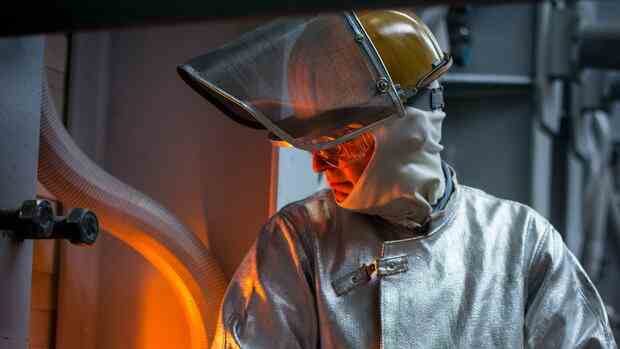To this end, the Federation of German Industries (BDI) and its two French partner associations France Industrie and Medef are calling for a clear framework for the development of the hydrogen infrastructure and changed production conditions in a joint paper from the EU Commission.
According to the joint statement, if research and development and the establishment of demonstration projects on an industrial scale can be advanced, there are “excellent opportunities for Europe to become the technological leader in the global hydrogen market”.
The BDI and its French partner associations appeal to the EU Commission not to set the standards for the production of green hydrogen too high.
Green hydrogen is produced by electrolysis using electricity from renewable sources. It is climate neutral. However, in many places there is a lack of sufficient amounts of renewable electricity. Electrolysis uses electricity to separate water into hydrogen and oxygen.
Controversy over green hydrogen
The three associations demand that electricity from other sources may also be used for electrolysis. “Many European countries are on the way to a low-CO2 electricity mix or already have this power mix, which represents a significant advantage for low-CO2 hydrogen production by electrolysis,” says the paper of the three associations.
The steel and chemical industries will need large amounts of hydrogen in the coming years to become climate-neutral.
(Photo: dpa)
“Given the urgency to limit global warming, the EU Commission should not limit the hydrogen market to hydrogen produced exclusively with electricity from renewable sources,” they write.
All technologies that enable the production of renewable and low-carbon hydrogen should be authorised. Hydrogen is also considered “low-CO2” if the electricity used for electrolysis comes from nuclear power plants. This aspect is particularly relevant for France with its large fleet of nuclear power plants.
Holger Loesch, deputy BDI general manager, says that the EU Commission must “not rule out any technology for the production of renewable or low-carbon hydrogen from the outset”.
>> Read here: Berlin, Madrid and Paris are fighting over the Pyrenees pipeline
For more security of energy supply and independence from individual energy suppliers, “companies need every available ton of hydrogen, especially energy-intensive industries such as steel and chemicals,” said Loesch.
France gets energy from its large fleet of nuclear power plants.
(Photo: imago stock&people)
Experts believe that it is impossible to produce enough green hydrogen from the start to meet the needs of industry. Relevant quantities of green hydrogen will not be available until the end of the decade at the earliest, because the necessary infrastructure is missing.
In Brussels, the conditions for the hydrogen ramp-up have been disputed for months. Climate protectors want hydrogen to be called “green” only if it was produced exclusively with renewable electricity. This is to prevent the newly emerging hydrogen economy from driving up the demand for coal and gas power.
Economy sees over-regulation
The rule should therefore be that the producers of hydrogen build wind farms and solar power plants and do not connect them to the power grid at all, but use them exclusively for the production of hydrogen. This would ensure that the use of hydrogen contributes to climate protection – and does not increase CO2 emissions.
Because of these considerations, the EU Commission decided on a narrow definition of “green hydrogen”. Electrolysers should only be allowed to be operated with electricity from the normal power grid in exceptional cases.
This is what the delegated legal act provided for, which the Commission proposed in the spring and released for consultation. An updated version is now available, which clearly meets the interests of business. According to this, hydrogen producers should now be able to obtain electricity via the normal grid. To do this, they would conclude green electricity contracts, similar to how private consumers can do it.
From the point of view of the economy, however, all this is still over-regulated. For example, Markus Krebber, head of the RWE Group, recently said in an interview with the Handelsblatt that much too demanding and complicated regulation by the EU Commission “completely chokes off the necessary ramp-up of the hydrogen economy”.
>> Read here: Germany could obtain hydrogen from these countries in the future
The federal government is now also calling for a more pragmatic approach. In government circles it is said that the plans of the commission are “too complicated”. The planned alliance between the German and French economies follows industrial logic: “No EU member state can produce enough hydrogen and build the necessary infrastructure on its own,” says BDI representative Loesch.
For the climate-neutral conversion of the European economy, green hydrogen must be available in gigantic quantities within a very short time. Brussels must therefore create a “clear framework for the development and expansion of the hydrogen infrastructure”. The same rules for the use of hydrogen should apply in all EU member states. An EU-wide certification system is also necessary.
More: EU agrees on dreaded climate protection instrument – associations warn of damage to industry
